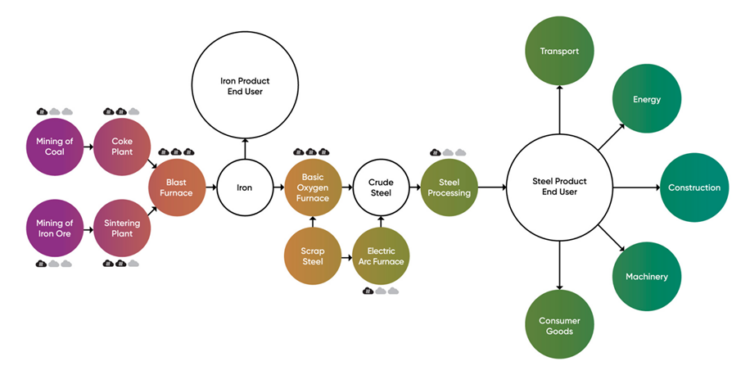How these 5 steel producers are taking action to decarbonize steel production
The International Energy Agency says that steel produces 7% of the world’s GHG emissions – 3.5 billion tonnes annually – mostly from iron, the main input to steelmaking (70% of steel production). The other 30% of global steel production comes from electric arc furnaces that use scrap steel as an input. As steel demand rises by up to 30% by 2050, according to the Mission Possible Partnership, the industry must continue to produce primary steel as recycling scrap steel alone cannot fulfil this demand.

Flow chart of steel making process.Image: Greenhouse
However, by 2030, near-zero emissions steel at scale can be achieved by using ambitious, innovative technologies and collaboration between steel purchasers, producers and companies providing enabling technologies. But significant barriers exist in the production process, substantially increasing costs. For instance, iron and steel production facilities are costly and designed for longevity, complicating their replacement.
Green premiums on lower-carbon products may disincentivize potential buyers, making it harder for steelmakers to invest in greener production processes since they must have confidence that their customers will bear at least some of this burden. In addition, not all the technology needed to produce near-zero emissions steel is currently available commercially. Some methods are still in the nascent stages of development and unprepared for large-scale implementation.
One avenue towards achieving near-zero emissions in steel production involves electrifying key processes e.g. using hydrogen in the direct reduction of iron. However, this transition necessitates renewable energy sources that have not yet been scaled to meet such demands.
Promise for near-zero emissions steel
A few highly ambitious steel makers, such as H2 Green Steel, show some promise that near-zero emissions steel is possible. The company is building a large-scale green steel production facility in Boden, Sweden, using renewable electricity and green hydrogen. The green steel produced will reduce carbon dioxide (CO2) emissions by up to 95% compared with traditional steelmaking.
The plant is due to begin producing steel in 2025, and several automotive companies, including several First Movers Coalition members, have signed off-take agreements to purchase steel from the company over the next few years.
The First Movers Coalition’s Near-Zero Steel 2030 Challenge was a recently concluded global initiative by the World Economic Forum and Greenhouse, with support from partners Boston Consulting Group, Deloitte, ResponsibleSteel and RMI.
It aimed to identify which companies will supply final steel products at First Movers’ near-zero emissions thresholds by 2030, which companies seek to buy these steel products and which companies are providing the enabling technologies for highly decarbonized steel production.
Of the challenge’s 109 entries, 17 submissions came in for the Steel Supply Challenge. An expert panel evaluated the submissions based on project success likelihood, technology maturity, emissions threshold and potential for scalability.
5 steel makers leading the charge
The challenge surfaced five promising steel manufacturers that have already achieved or have the potential to reach near-zero emissions steel by 2030. Further analysis is needed to ensure the sustainability of wider steel production processes e.g. responsible forestry management for charcoal production.
Additional auditing is also needed to verify the projects will meet the near-zero steel emission threshold of less than 400 kilograms (kg) (0% scrap inputs) to less than 50 kg (100% scrap inputs) of CO2/tonne of crude steel produced, as per guidance from the International Energy Agency. These submissions demonstrate the ambitious technological innovations being employed by steelmakers around the world.
These promising steel supply challenge entries are also being admitted to the First Suppliers Hub, the First Movers Coalition’s growing repository of near-zero emissions products.
Replacing coal with sustainable charcoal
Brazilian integrated long steel producer Aço Verde do Brasil has achieved the milestone of carbon-neutral steel production, certified by Société Générale de Surveillance following the GHG Protocol and methodologies internationally recognized by the World Steel Association. No more than 60-100 kg of CO2 per tonne of steel is released from the production process.
With a production capability of 600,000 megatonnes/year, the steel mill based in northern Maranhão state relies on renewable power and has invested in the circular use of raw materials. Its hot metal production uses 100% biocarbon, replacing traditional coal. The company also has 50,000 hectares of planted eucalyptus for sustainable charcoal and captive pig iron production.
Gerdau is another Brazilian steel manufacturer that is using charcoal as a bioreducer, replacing mineral coal. It is Brazil’s largest steel producer and the largest recycler in Latin America, with 11 million tonnes of scrap recycled annually. It is also the biggest charcoal producer in the world, with 250,000 hectares of forestry base. Its steel production at the company’s Divinópolis Mill in Minas Gerais is expected to generate CO2 emissions per metric tonne of steel at the level of 300-400 kg by 2031.
H2-based direct reduction of iron
Hydnum Steel is the first green steel mill in the Iberian Peninsula. Its mission is to help decarbonize the steel industry by developing a digital, efficient, and CO2-free plant. Though currently at a pre-production stage, Hydnum Steel aims to commence production of near-zero steel by 2027, with an almost zero carbon footprint, reducing the CO2 equivalent per tonne by 98% compared with the traditional blast furnace route.
This will be achieved through a combination of 100% renewable energy, green hydrogen, recycled scrap and the H2-based direction reduction of iron. Hydnum Steel also incorporates technological water solutions to treat graywater and wastewater to use in the production process.
In the meantime, Green Steel of Western Australia (GSWA) aims to create a sustainable steel industry for the region. The company is developing a 450,000 tonne/year green steel recycling facility (Australia’s first steel mill in over 30 years) in the town of Collie.
The electric arc furnace-based plant will use electricity to recycle 500,000 tonnes of local scrap steel to manufacture near-zero-emission steel reinforcing bars for Australian and international consumption, with operations commencing in 2026. GSWA is also developing a 2.5 million tonnes/annum natural gas/hydrogen direct reduced iron plant in the mid-west of Western Australia, which will produce green iron for export. GSWA believes the plant is the key to unlocking Western Australia’s green hydrogen and steel industries.
Leveraging carbon capture and hydrogen-based production
In 2016, a collaborative effort was established between Emirates Steel Arkan, the largest steel and building materials manufacturer in the UAE, Alreyadah and ADNOC to capture CO2 from the former’s direct reduction plant. In 2023, Emirati state-owned renewable energy company Masdar announced a partnership.
Masdar is developing the Middle East and North Africa’s first green hydrogen-based project to decarbonize the UAE’s steel sector. Emirates Steel Arkan’s product portfolio includes green steel products with a low carbon intensity. According to the company’s definition of green steel, which aligns with the GHG Protocol and has been certified by a third party, the range of estimated emissions for these products is 300-400kg CO2/tonne of crude steel.
These pioneering technologies and collaborative efforts are paving the way for a greener steel industry and providing inspiration to others like them.








